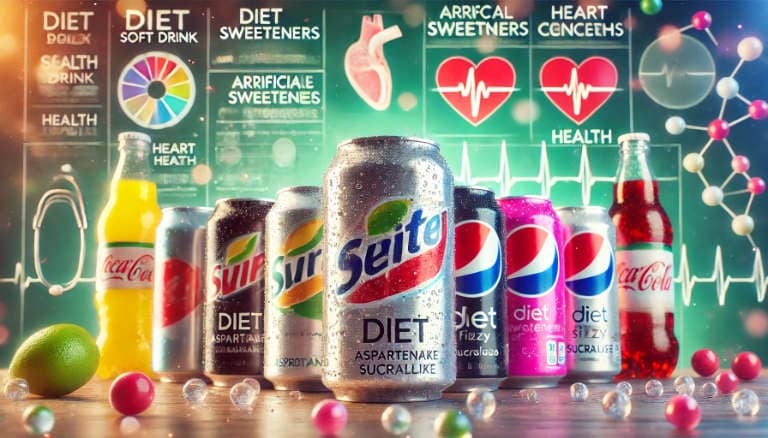
So you’ve decided to take control of your diet and try and live a healthier life, but you just can’t resist fizzy drinks. In your mind, you rationalise the decision and decide that you can keep drinking it as long as you switch to diet drinks instead. It’s a choice that millions of people make every year, as the clever marketing departments of large drinks companies convince us that switching to a diet version is a perfectly healthy alternative.
The reality is that these claims are simply untrue! Most drinks manufacturers use an artificial sweetener, called aspartame, to replace sugar in their diet drinks. A study carried out by the University of Iowa has shown that this chemical is linked to an increased likelihood of heart disease.
Table of Contents
Dangers of Drinking Diet Drinks
The study, headed up by Dr. Ankur Vyas, was one of the most comprehensive of its type with nearly 60,000 postmenopausal women participating over nine years. Known as the Women’s Health Initiative Observational Study, the research found that participants who drank two or more cans of diet soda a day were 30% more likely to have a cardiovascular event (e.g. heart attack) and 50% more likely to die of a heart-related disease than someone who drank none.
‘This is one of the largest studies on this topic, and our findings are consistent with some previous data, especially those linking diet drinks to the metabolic syndrome,’ said Vyas. Given the scale of the study and the fact that approximately one in five people in the United States consume diet drinks on a daily basis, the results could prove to be hugely significant to overall public health.
The Research
The 59,614 participants were split into four groups by the research team: two or more diet drinks a day, five to seven diet drinks per week, one to four diet drinks per week, and zero to three diet drinks per month.
After nearly nine years the health records of each woman was analyzed and the results were that coronary heart disease, congestive heart failure, heart attack, coronary revascularization procedure, ischemic stroke, peripheral arterial disease, and cardiovascular death, occurred in 8.5% of the women consuming two or more diet drinks a day compared to 6.9% in the five-to-seven diet drinks per week group; 6.8% in the one-to-four drinks per week group; and 7.2% in the zero-to-three per month group.

The results, on the surface, didn’t appear to fit the hypothesis that aspartame was one of the leading causes of heart disease. However, the records showed that alongside the slightly higher rate of heart-related health issues, the women in the two or more a day group were, on average, significantly younger than the women in the other groups, meaning the diet sodas were causing health issues at an accelerated rate. The women in this group also had the highest average BMIs, the highest rate of diabetes and highest average blood pressure.
Despite the scale of the study, no official conclusion can be drawn but the initial signs are worrying. ‘Based on these and other findings we have a responsibility to do more research to see what is going on and further define the relationship,’ Vyas explained. ‘This could have major public health implications.’
Are You Concerned About Your Heart Health?
If you are concerned about your cardiovascular health and looking for a proactive way to reduce your risk, consider exploring a structured cardiac rehabilitation programme like those offered by Cardiac Lauren. Lauren Walker, a specialist in cardiac rehabilitation, provides tailored online programmes that focus on improving heart health through exercise, education, and lifestyle adjustments. Whether you are recovering from a cardiac event or looking to make positive changes, her programmes offer accessible and expert-led support. Learn more by visiting her website at Cardiac Lauren.
Think Before You Drink
Several more research projects have been commissioned since the publication of the University of Iowa’s results, in order to deduce the scale of the issues that aspartame can cause. However, the advice in the meantime is to cut out soda drinks from your daily life and, even if you do occasionally indulge, regular soda is actually better for you than the diet variety.
The money pumped into making diet soda appear as a healthy alternative is further proof that many large companies are far more concerned with lining their pockets than benefitting their consumers. When it comes to the things you eat and drink, make sure you know exactly what you are putting into your body.
Understanding Artificial Sweeteners in Fizzy Soft Drinks
Artificial sweeteners are a key ingredient in diet fizzy soft drinks, designed to provide the sweetness of sugar without the calories. Common sweeteners like aspartame, sucralose, and saccharin are used widely in these beverages. While they are marketed as a healthier alternative to sugar, research has raised concerns about their long-term impact on health.
Aspartame, one of the most commonly used sweeteners, has been linked to potential risks including metabolic changes and cardiovascular issues. Sucralose, often touted as safe, may disrupt gut microbiota, potentially affecting digestion and immunity. These sweeteners trick the brain into craving more sugar, potentially leading to overeating and undermining weight management goals.
Health Risks Associated with Diet Fizzy Soft Drinks
The health risks linked to diet fizzy soft drinks extend beyond just empty calories. Studies have shown that frequent consumption may contribute to a range of health issues:
- Metabolic Changes: Artificial sweeteners can alter the body’s response to sugar, increasing the risk of insulin resistance and type 2 diabetes.
- Cardiovascular Risks: Research, such as the University of Iowa study, has linked diet fizzy soft drinks to a higher likelihood of heart attacks, strokes, and other cardiovascular events.
- Gut Health Issues: Sweeteners like aspartame and sucralose can disrupt the balance of gut bacteria, leading to digestive problems and affecting overall health.
While diet drinks may seem like a good alternative, the risks they pose to long-term health are becoming increasingly evident.
Healthier Alternatives to Fizzy Soft Drinks
If you are looking to cut back on diet fizzy soft drinks, there are plenty of healthier and equally enjoyable options:
- Infused Water: Add slices of fruit, cucumber, or fresh herbs like mint to plain water for a refreshing, naturally flavoured drink.
- Sparkling Water: Opt for plain or naturally flavoured sparkling water as a fizzy alternative without the additives.
- Herbal Teas: Enjoy herbal teas, served hot or iced, to satisfy your craving for flavour while also promoting hydration.
- Homemade Juices: Blend fresh fruits with water or ice for a natural, nutrient-rich beverage.
Switching to these alternatives can help you stay hydrated and satisfy your cravings without compromising your health.
Tips for Reducing Diet Fizzy Soft Drink Intake
Cutting back on diet fizzy soft drinks can be challenging, especially if they are a regular part of your routine. Here are some practical tips to make the process easier:
- Reduce Gradually: Start by drinking fewer cans per week, replacing them with healthier options like water or herbal tea.
- Identify Triggers: Pay attention to the situations or emotions that lead you to reach for fizzy drinks, and find healthier habits to address those moments.
- Stay Hydrated: Keep a bottle of water with you throughout the day. Proper hydration can reduce cravings for sweetened beverages.
- Try Flavour Enhancers: Experiment with adding fresh fruit or a splash of natural juice to water for a hint of sweetness without added sugar or artificial sweeteners.
Making small, consistent changes can help you transition away from diet fizzy drinks while supporting your overall health.
The Role of Marketing in Diet Fizzy Soft Drink Consumption
The popularity of diet fizzy soft drinks is driven largely by clever marketing campaigns that position them as guilt-free indulgences.
Advertising often highlights their lack of calories, leading consumers to believe they are making a healthier choice. However, these messages frequently omit the potential health risks associated with artificial sweeteners.
Big beverage companies invest heavily in campaigns that target people looking to lose weight or improve their health, creating a perception of diet drinks as a safe option.

In reality, the long-term consequences of these products are often under-explored in marketing narratives. Understanding how marketing shapes consumer choices can empower you to make informed decisions about your health.
Seeking Support for Lasting Change
If you are finding it difficult to cut back on diet fizzy soft drinks or make healthier lifestyle changes, professional support can make all the difference. At The Surrey Institute of Clinical Hypnotherapy, we specialise in helping individuals overcome habits and behaviours that negatively impact their health. Using proven hypnotherapy techniques, we can help you build a healthier relationship with food and drinks, reduce cravings, and make positive changes that last.
Our approach is tailored to your needs, offering guidance and support in a compassionate, judgement-free environment. Take the first step towards a healthier you by visiting our website at The Surrey Institute of Clinical Hypnotherapy to learn more about how we can help you achieve your goals.
